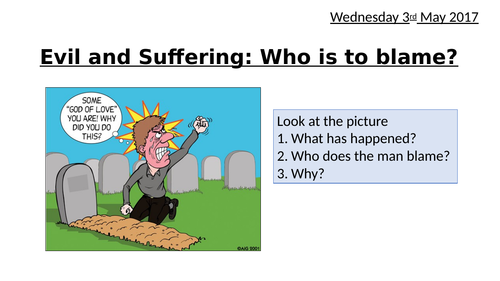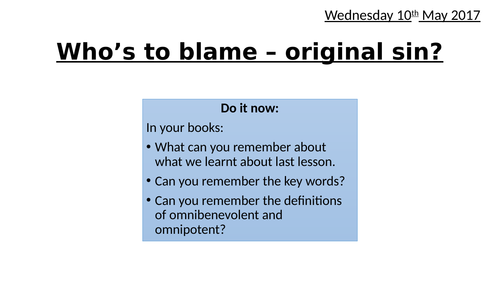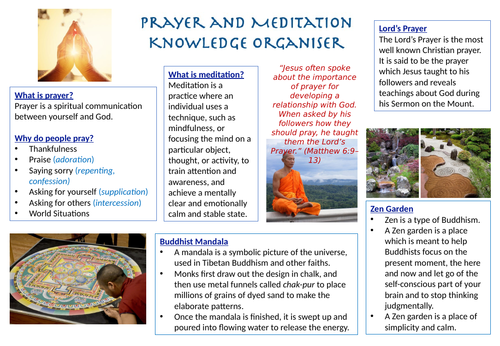338Uploads
119k+Views
41k+Downloads
Philosophy and ethics

Theory of Evolution
KS3 Philosophy and Ethics - Lesson 6 of the Science and Religion SoW.
This lesson looks at ‘What is the Theory of Evolution’?
Students will be able to:
Evaluate arguments for and against and give your own opinion, with a reason, on the Theory of Evolution.
Explain the evidence given by science to prove the existence of evolution.
Describe what this theory tells us about life on Earth.
State who came up with the Theory of Evolution and how he knew this.
All resources are included!
Feedback is welcome, please check out the rest of my lessons in the Science and Religion Scheme of Work!

What happens when we die? - Religion
KS3 Philosophy and Ethics - Lesson 3 of the ‘What Big Questions are there?’ Scheme of Work.
This lesson looks at 'How do different religions answer the question ‘What happens when we die?'
This lesson looks at the religious answer to ‘What happens when we die?’ - Looking at the 6 major religions and their beliefs.
By the end of the lesson, students will be able to:
Explain what you believe and express your opinion on issues relating to what happens when we die.
Describe what the worlds six main religions believe happens when we die.
Understand and explore examples of ‘Near Death Experiences’.
Resources are included - including an information sheet and differentiated table for students to fill in!
Feedback is welcome, please check out the rest of my lessons in the ‘What Big Questions are there?’

Five Pillars of Islam | Islam
KS3 Religious Studies - Lesson 3 of the Islam scheme of work
This lesson looks at The Five Pillars of Islam.
This lesson looks at the Five Pillars. Students will complete a worksheet (gap fill task) on the Five Pillars using a video, and will then reflect and consider what their Five Pillars are - what is important to them?
All worksheets and resources needed are included – ready to download and teach!
Feedback is welcome, please check out the rest of my lessons in the Islam scheme of work.

What is the Religious Method?
KS3 Philosophy and Ethics - Lesson 2 of the Science and Religion SoW.
This lesson looks at ‘What is the Religious Method’?
Students will be able to:
Explain why you think religion is important.
Use the ‘religious method’ to decide what societies have a religion.
Describe what the ‘religious method’ is used for.
Give two expectations you have of religious people.
All resources are included.
Feedback is welcome, please check out the rest of my lessons in the Science and Religion Scheme of Work!

Who is to blame for evil and suffering?
Full lesson plus activities and for teaching who is to blame for evil and suffering. Suitable for 11-16 Philosophy and Ethics or Religious Studies.

Pandora's Box
Whole lesson plus differentiated activities and links to videos. For teaching 11-16 Philosophy or Religious Education.
Bundle

Evil and Suffering Scheme of Work
SAVE 25%!!!
Whole Scheme of Work for teaching the unit Evil and Suffering for Religious Studies/Philosophy and Ethics.
All 5 lessons include differentiated resources, activities, and everything you need to teach it straight away.
Starts off with looking into the idea of evil and suffering with Pandora’s box, the following lessons explore the idea of who is to blame - the Devil, us, and do we need suffering?
Pandora’s Box
Who is to blame
Original Sin
The Devil
Do we need suffering?
Please review if you purchase.

Evil and suffering - original sin
Who is to blame for evil and suffering? This lesson explores original sin. Whole lesson plus resources and differentiated activities included.

What is Science?
KS3 Philosophy and Ethics - Lesson 3 of the Science and Religion SoW.
This lesson looks at ‘What is Science’?
Students will be able to:
Explain what the scientific method is and use it to look at real life experiments.
Discuss at least two things that science now explains that used to be explained by religion.
State at least three areas that are involved in science.
All resources included!
Feedback is welcome, please check out the rest of my lessons in the Science and Religion Scheme of Work!

Prayer and Meditation Knowledge Organiser
Knowledge Organiser for teaching Prayer and Meditation at KS3.
This colourful knowledge organiser covers:
What is prayer?
What is meditation?
The Lord’s Prayer
Buddhist Mandala’s
Zen Gardens
All on one A4 page! Perfect for revision.
Please review if you purchase, feedback is welcome.

How do myths answer Big Questions?
KS3 Philosophy and Ethics - Lesson 2 of the ‘What Big Questions are there?’ Scheme of Work.
This lesson looks at ‘How do myths answer Big Questions?'
This lesson looks at how myths are used to answer some of the Big Questions, with a particular focus on the origins of the universe.
By the end of the lesson, students will be able to:
Explain why people made up myths to answer their questions, using specific examples.
Describe what a myth is and look at some examples from around the world.
Understand how primitive people tried to explain their ultimate questions.
Feedback is welcome, please check out the rest of my lessons in the ‘What Big Questions are there?’
Bundle

Islam SOW BUNDLE!
Islam Scheme of Work BUNDLE!
Suitable for KS3 Religious Studies / Philosophy and Ethics
This bundle includes 6 lessons - all fully resourced!
This Scheme of Work explores Islam in depth, looking at what it is like to be a Muslim. Included is a lesson on Islamophobia, an important lesson for students taught in a sensitive way.
Lessons included:
Introduction to Islam
Five Pillars of Islam
Features of a Mosque
Why do Muslims go on Hajj?
Respecting the Qu’ran
Islamophobia
Please review if you purchase.












